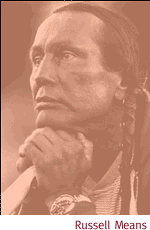
From Indian Activist To Hollywood Celeb.
By Mari Wadsworth
Where White Men Fear to Tread: The Autobiography of Russell
Means, edited by Marvin J. Wolf (St. Martin's Press).
Cloth/Paper, $26.95/$16.95.
LOVE HIM OR hate him, you can't ignore him; and that's
no doubt just the way Russell Means likes it
 His early years as an accountant-turned-activist won him notoriety
if not always praise, most notably for co-leading a 71-day armed
siege in 1973, on the sacred grounds of Wounded Knee, on South
Dakota's Pine Ridge Reservation.
His early years as an accountant-turned-activist won him notoriety
if not always praise, most notably for co-leading a 71-day armed
siege in 1973, on the sacred grounds of Wounded Knee, on South
Dakota's Pine Ridge Reservation.
What started as a stand-off over a land-use treaty involving
nearly one-eighth of the reservation's mineral-rich lands escalated
into a violent skirmish with the feds with tragic consequences--two
Lakota deaths and the paralysis of one federal agent.
 "Things could not continue as they were," he writes
of the events leading to Wounded Knee. "If we didn't stand
up now for our treaty, we would never be able to do so. Our people
were ready to die, if necessary, to end the abuse."
"Things could not continue as they were," he writes
of the events leading to Wounded Knee. "If we didn't stand
up now for our treaty, we would never be able to do so. Our people
were ready to die, if necessary, to end the abuse."
There's no question that Means is a remarkable man; one who's
lived a life like few others in this century. Though at first
glance it may seem strange company, he's like Bob Marley, Malcom
X and Ceasar Chavez--the rare, charismatic leader who manages
to bring the long-standing plight of a marginalized group into
mainstream consciousness by being media savvy, militant, and genuinely
concerned for the social justice of his people.
Seemingly destined for immortality like Marley, feared like Malcom,
and credited for a selfless social activism like Chavez's, Means
is no easy personality to summarize. Egomaniac? Visionary? A Chosen
One? He'd probably tell you to call him whatever you want, just
as long as you don't get in his way. And that would be advice
well-heeded: He's been shot, stabbed, incarcerated, and tried
on 13 occasions, once for murder.
In fact he's been called "one of the angriest, toughest
American Indian activists of our times," and "the most
famous American Indian since Sitting Bull and Crazy Horse,"
the latter by the L.A. Times. His indomitable, handsome
mug seems to have become a modern archetype of The American Indian,
plastered as it's been on movie screens and TV commercials for
the past decade. Last year, he even crossed-over to the animated
kingdom as the voice (and apparent model) for Chief Powhatan in
Disney's Pocahontas.
And then there are those controversial alliances with the likes
of Louis Farrakhan and the Rev. Sun Myung Moon...
Hollywood was made for Means, who cut his teeth in the
spotlight by urinating on George Washington's Mount Rushmore head;
being the vice-presidential running mate of Hustler publisher
Larry Flynt; plaintiff against the Cleveland Indians baseball
team for "insulting his heritage" with its red-faced,
tomahawk-wielding mascot; and stopping a Columbus Day parade in
protest of the Italian explorer he's not alone in considering
a "genocidal heathen." These are just the dramatic highlights.
One can almost hear some white-bread Hollywood producer leaning
back in his leather chair, grinning, "Means, baby, where've
you been all my life?"
One thing's sure: Hollywood's getting as good as it gives where
its new darling is concerned. Asked to read for the title role
in Last of the Mohicans, Means turned heel and went home
after the first-class ticket he demanded was downgraded by the
studio to coach class. Don't let that noble, windswept countenance
fool you: Means has wit and attitude to spare, and at this point
in his life he's getting the last laugh, often with loaded one-liners
on his exploits like, "It's all tied up in white tape."
This is the kind of action and language you can expect from Where
White Men Fear to Tread: The Autobiography of Russell Means,
edited by Marvin J. Wolf. In addition to a detailed chronology
of his early years (1939 to 1964) on the Pine Ridge reservation,
he offers a history of the Lakota people, myriad documented acts
of bad faith and exploitation of treaty law between his U.S. and
tribal governments, and welcome reflection on the young man he
was from the older, wiser elder he's become. (At 57, he's the
proud grandfather of 18.) For instance, he allows that much of
that hot-blooded hellraising sprang not from courage or conviction,
but low self-esteem. A more mellow Means, grateful to have lived
to tell about it, at times offers inspired perspective for the
young American Indians of all nations to whom his book is dedicated.
Critical readers do well to remain skeptical of any individual,
however charismatic, who claims to be the voice of authority and
authenticity for any population, let alone one as diverse as the
native tribes of the Americas. But whatever conclusions one makes
of Means' actions and intentions, his unremitting presence and
undaunted outspokeness opened a dialogue that changed the course
of American history. And it's a good read, to boot.
Russell Means discusses and signs Where White Men
Fear to Tread from 1 to 3 p.m. Saturday, December 13,
at The Book Mark, 5001 E. Speedway. Admission is free.
Call 881-6350 for information.

|





